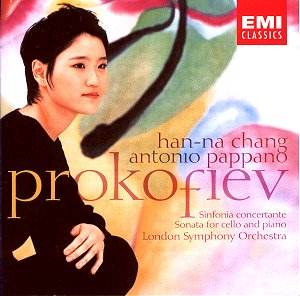Even with the greatest composers, the path to
the completion of a work does not necessarily run true, even if
the results sound absolutely convincing. Take the Prokofiev Symphony-Concerto,
as he called his reworking of his earlier Cello Concerto. The
latter was not a success at its 1938 premiere, and the composer
knew it. He was encouraged to return to the music on hearing the
young Mstislav Rostropovich play it with ardour of the utmost
commitment, some nine years later. Not that he changed his mind
completely - the experience led him to undertake a thorough-going
revision, a fact he emphasised by the new title Cello Concerto
No. 2. Still unsure about the music's worth, he revised it again
during 1952, his penultimate year, and this final version he renamed
Symphony-Concerto. (The more traditional title, Sinfonia Concertante,
which is used with this EMI issue, is unhelpfully archaic.)
The young Korean cellist Han-Na Chang combines
most effectively with Antonio Pappano and the LSO, in a performance
which shows just how successful Prokofiev's revisions were in
creating a masterwork. The rich textures of the orchestral sound
are well captured in the pleasing Abbey Road Studio acoustic,
and the musical argument receives a tightly controlled, firmly
directed interpretation which suits it particularly well. The
emotional side of the music is revealed also, as Chang's sure
intonation and deeply felt lines conquer all challenges. She is
at her best towards the top of her range. The articulation of
the fast central Scherzo is crystal clear, despite the daringly
fast tempo, and this serves at the same to intensify the effect
of the more lyrical balancing phrases. All praise to Pappano's
control of the orchestra, as the brass interjections make their
biting point. The cello is placed a little prominently in the
perspective, certainly more so than any but the front rows would
experience at a live concert. But since the playing is so good
Chang stands up to this test.
Pappano makes a subtle accompanist in the Sonata,
supporting the cello line with great concern for balance and detail.
This is another late work, composed in 1947 when Prokofiev's health
was failing, though not the standard of his inspiration. Since
these two pieces have so much in common - their dates as well
as their natures - they make an attractive coupling.
Terry Barfoot

